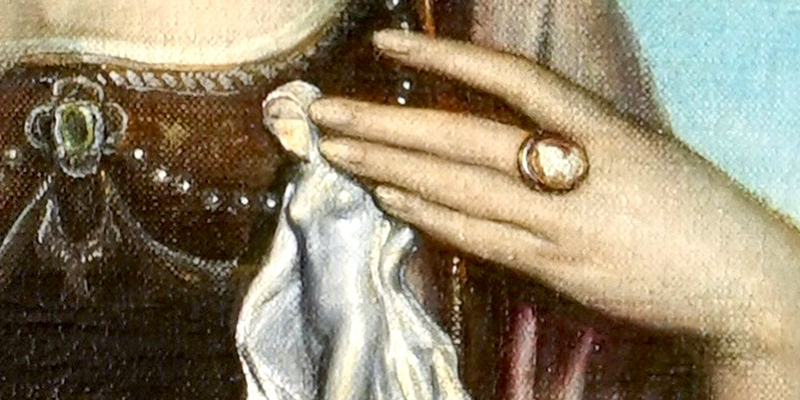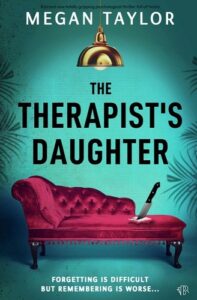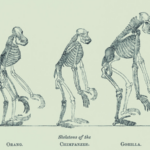I’ve been a crime fiction addict for years, but my very first love was horror. Luckily for me and so many other grateful readers, there are plenty of fabulously frightening authors, like Hjortsberg, Gruber, Connelly, Beukes, and of course Mr King, who seamlessly blend both genres, suffusing their murder and mayhem with the supernatural. But as much as I enjoy their spooky and often demonic thrills, there’s a special place in my twisted heart for mysteries where the horror is more ambiguous, with a subtler sense of the uncanny woven through the story of a crime.
While my latest novel, The Therapist’s Daughter, deals primarily with the palpable mess of human relationships and tangible physical threats, it also dabbles in occult paraphernalia and obscurer fears, and during the writing, I found myself returning to a particular type of shadowy fiction.
Many of my favorite books resist straightforward classification, blurring genre lines in the same way that their unnerving undercurrents refuse to be pinned down. Some of the novels listed below prioritize the power of suggestion over any definitive resolutions, deliberately entering the disorientating territory described by Freud in his famous 1919 paper, ‘The Uncanny’ (Das Unheimliche). There is something fundamentally ‘off’ about their settings and characters. The familiar is made unfamiliar, and repressed emotions seep through like pesky—or petrifying—spirits, which refuse to be contained.
Other books on this list meld psychological and paranormal elements more directly with crime, playing with ideas of possession and curses and ghosts. But whether they hint at an underlying darkness or evoke a state of chilling existential dread, each of these novels is steeped in the kind of eerie atmosphere that threatens to unsettle your perceptions and infect your dreams. I dare you to read them and not feel haunted…
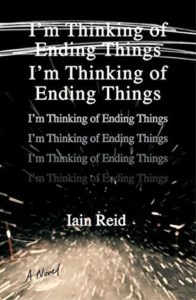
Ian Reid, I’m Thinking of Ending Things
With its ominous digressions, compulsive refrains, and pervasive claustrophobia, Reid’s road-trippy psychological thriller is undeniably mind-bending. I don’t want to venture anywhere close to spoilers, so all I’ll say is that the narrator and the reader are constantly wrong-footed and that Jake’s girlfriend’s visit to his parents’ house is crammed with enough uncanny moments that even Freud’s ghost would be impressed. These include missing and misplaced objects, doubled images and oddly familiar photographs, and a basement full of buried secrets—and once Jake and his girlfriend hit the road again, things only keep growing weirder.
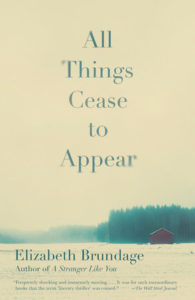
Elizabeth Brundage, All Things Cease to Appear
The spell of Brundage’s beautiful, mournful novel is quiet but compelling. It begins with what seem to be the disembodied voices of a haunted house contemplating the lives that have passed by and the mysteries to come. As the novel goes on and the truth behind a crime is unravelled, the living characters sometimes seem aware of presences beyond themselves, and alongside their stories, the reader learns about the house’s heartbreak from the perspective of the dead. But throughout the elegant writing and construction, we are never allowed to forget the vicious axe murder that grounds the narrative. All Things Cease to Appear is a very dark lullaby indeed.
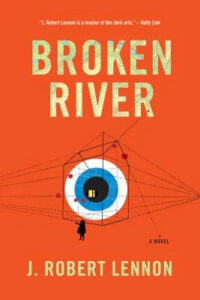
J. Robert Lennon, Broken River
With Broken River, we have another house in the middle of nowhere, more brutality and senseless death, and something freakily ‘other’ going on. But in Lennon’s psychological thriller, the eeriness that surrounds a terrible crime and its equally tense aftermath is provided by an unusual and incredibly effective structuring device.
From the opening, in which a double murder is revealed (and rendered all the more horrible for the way it’s mostly presented off-screen through sounds and suggestion), the reader is accompanied by the Observer, an invisible, phantom-like, unexplained presence.
Years after the killings, when new residents Eleanor and her twelve-year-old daughter, Irena, become dangerously obsessed with the unsolved crime, the Observer sometimes seems to represent their morbid curiosity. And as the novel’s ominous action ramps up, it isn’t just the characters’ fascination that the Observer might reflect; this watching presence raises uneasy questions about complicity that possibly implicate the reader and the author too. But Broken River provides no easy answers, and perhaps it is that, as much as the gripping plot, which gives this book its unsettling power.

Sarah Waters, Affinity
It was tricky to decide which wonderful Waters novel to choose. The Little Stranger, which begins as a traditional haunted house story and, layer by layer, becomes something creepily else, was tempting, but I’m going with Affinity because, for all its overtly gothic tropes, it’s concerned with crime and conspiracy from the outset.
Margaret Prior is a volunteer visitor at Millbank prison when she meets disgraced spiritualist Selena Dawes, convicted for her role in an unexplained death at a séance. With her trademark twists and reveals, Waters deftly delivers the noirish story of the affinity between these two women, but what lingers is the novel’s darkness. Dread slithers through love and longing as queasily as the crawling fingers of Selena’s spirit guide’s waxy hand.
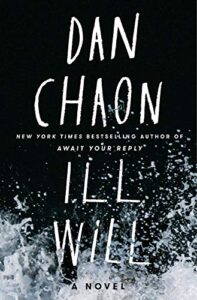
Dan Chaon, Ill Will
In addition to incorporating a disturbingly dark alternative storyline, Ill Will, like my latest novel, features a therapist who’s misguided, to say the least.
Ill Will’s psychologist, Dustin Tillman, has learnt to live an extraordinarily passive life in the wake of a childhood shaped by the murders of his parents and aunt and uncle. But everything changes when he hears that his adopted brother, who was convicted for the crimes amid the Satanic Panic of the 80s, is about to be released. Unable to deal with the past, Dustin finds himself drawn into a patient’s serial killer theories about a recent series of drownings. Soon the stories he has always told himself are spiraling out of control.
Chaon interweaves truth and memory and self-deception like an evil magician, expertly messing with his readers’ heads. At times, the text breaks down along with his characters, and whichever version of Dustin’s story you choose to believe, this novel burrows underneath your skin.
And while I’m here, I’d also like to give a shout out to Chaon’s brilliant and frequently eerie short stories, particularly ‘The Farm. The Gold. The Lily-White Hands’, where the characters are inventively and chillingly haunted by the ghosts they might have become.
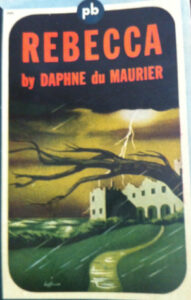
Daphne du Maurier, Rebecca
Back (way back) when I was at university, I had to argue my case for writing my dissertation on du Maurier; in the 90s, her work still wasn’t considered quite part of the literary canon. But over the years, Rebecca has been recognized as the absolute classic it so clearly is, and with its jarring psychological revelations and building menace, how could I not include it here?
While far from a conventional ghost story, Rebecca is very much a novel about being haunted. From its famous opening dream to its vivid and often shrine-like spaces, the past continually threatens to engulf the present, and secrets and emotions refuse to be suppressed. With each rereading, Rebecca bowls me over and, like its nameless and definitely destabilized narrator, I’ll never stop returning to Manderley.

Paul Tremblay, A Head Full of Ghosts
Although seemingly the most blatantly spooky book on this list, the horror in Tremblay’s novel is as much psychological as supernatural. Paced and structured like the best of thrillers, A Head Full of Ghosts explores the mystery behind fourteen-year-old Marjorie Barrett’s suspected demonic possession and the criminally unethical reality TV show that documents her descent into the dark.
Tremblay combines genuinely frightening scenes and images—Marjorie’s physical contortions and transformations, the trauma of her exorcism, and her tales of ‘Growing Things’—with questions about the slippery nature of truth, our (in)human condition, and the monsters that we fear or need (concerns he also expands brilliantly in his terrifying recent novel, Horror Movie). As a result, Tremblay’s possession story possesses his readers, filling our heads with ghosts.
***

